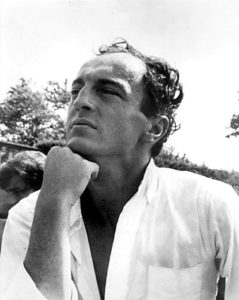By Brett Peruzzi, Contributing Writer

Photo/submitted
Grafton – Poet Frank O’Hara was a prominent figure in the mid-20th century literary and art world in New York City, but in his hometown of Grafton, his profile is decidedly lower.
O’Hara was born in Baltimore in 1926 but moved to Grafton with his family at an early age. He attended St. John’s High School in Shrewsbury, and then served in the Navy during World War II. After the war he attended Harvard University. In 1951 he moved to New York City, where he would live the rest of his life, juggling his writing and a job at the Museum of Modern Art, where he eventually became an associate curator.
While the Grafton Public Library has many of his books, reference librarian Heidi Fowler doesn’t believe patrons who borrow them know he was from Grafton.
“I don’t think he’s all that popular with patrons these days,” she said. “But he does get some attention.” Of the books by him that the library has in circulation, all have been checked out less than 10 times in the past several years.
“The rest of the books we have by him are in the ‘Grafton Collection’ which does not circulate, so knowing how many people have looked at them is tricky,” Fowler explained. “If they looked at the Grafton Collection editions, they’d know from the section they are in that he has some tie to Grafton.”
The Grafton Historical Society does include information about him in its collection, but interest appears low.
”The society does have a detailed notebook on Frank O’Hara, including some of his works,” said Nancy Therrien, who has been president of the society since 2014. “Right now we do not have a special display for Mr. O’Hara and truthfully we haven’t had an inquiry about him in the years I have worked as president.”
In the literary world, however, interest in, and appreciation of O’Hara and his work has grown greatly in the 50-plus years since his untimely death in an accident at age 40 in 1966.
“Though Worcester was late to appreciate O’Hara’s significance, scholars like Prof. Laura Menides of Worcester Polytechnic Institute understood his importance as one of Worcester’s ‘Big Four’ of nationally and internationally known poets: Stanley Kunitz, Elizabeth Bishop, Charles Olson and Frank O’Hara,” said Rodger Martin, president of the Worcester County Poets Association (WCPA).
Because of O’Hara’s importance, the WCPA renamed its annual contest “The Frank O’Hara Prize.”
“In almost all major anthologies of 20th-century American poetry, O’Hara has a significant place,” Martin noted. “He was a major influence on later American poets like John Ashbery. His work as a curator at the Museum of Modern Art created a bridge between painters like Jackson Pollock and the New York poets.”
Alan Feldman, a retired Framingham State University English professor who published a book about O’Hara’s life and work, provided additional perspective on the poet’s significance.
“He’s become one of the most influential and widely read poets of the post-war period in the 20th century,” Feldman noted. “Originally known only as one of the so-called New York School poets, his influence has spread among younger poets who value the way he adapted colloquial speech in his lyrics, his off-hand spontaneity, and his absorption of the urban environment…He remains an important touchstone for many gay people, although he wrote in a time when public discussion of homosexuality wasn’t practical.”
Feldman also noted how O’Hara’s reputation has grown in the decades since his death.
“When I first wrote about O’Hara in the ‘70s, Robert Lowell was considered the preeminent poet of the post-war period and O’Hara was hardly known at all. Since then,” he observed, “O’Hara has far eclipsed Lowell … as a source of inspiration and influence on the poets who have come along later. His star has risen significantly.”
What makes the poems of this man from Grafton so distinctive?
“I always loved his work because I found his poems often both funny and very moving,” said Feldman. “Like the best of poets he’s completely one-of-a-kind, though he’s often been imitated.”














